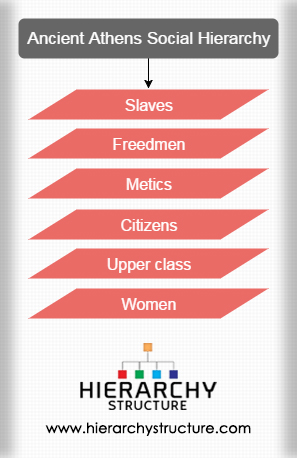Athens was an important city state in ancient Greece. It was known for its superior civilization. However, the social structure of the city state was hierarchical, birth and gender being the determining factors in this hierarchy. There were generally many groups of people constituting the society, like, aristocratic men, women, children, slaves, immigrants, slaves etc. In the class based society, a person’s birth was of terrible importance, because, one cannot hope to climb up the social ladder if they are born in a lower class family. Here is a short survey of the hierarchy that prevailed in the ancient Athenian society.

The society was divided into several sections such as citizens, freedman, upper class people, slaves, women etc.
- Slaves- Slaves were at the base of the social structure. It was estimated that around 400 B.C. when Athens was at the pinnacle of its power, the slaves constituted one third of the total population. In this class not too many people of Greek social origin were to be found, abandoned babies, war prisoners etc were generally bought and sold as slaves. The jobs of the slaves depended on their education, gender, skill etc. They were always poor, and did not have any rights whatsoever.
- Freedmen- This class constituted mostly of the ex-slaves, who were somehow freed from their bondage. They did not get the status of a citizen, like the slaves or the Metics, and could not take part in the government. Their freedmen in most cases were purchased by a wealthy friend or relative.
- Metics- Metics are basically foreigners, living in Athens. They could be rich or poor. In order to own property, the Metics needed prior permission. They could not vote or take part in the government. However, they could educate their sons, and like citizens they were supposed to perform military duties. It was customary for them to ensure sponsorship from a citizen, without which they could be turned into slaves. Interestingly though, unlike the slaves, a Metic could influence the thought and action of a citizen, who was ranked higher than him in the social structure.
- Citizens- Citizens were men with citizenship rights, who were born free. In order to be a citizen, one needed to have parents of Athenian Greece origin. The citizens were mostly professional men such as contractors, traders, manager, manufacturers, craftsmen etc. They could vote, perform government functions and were expected to provide military service to the state of Athens.
- Upper class- They sat on the higher ranks of the social hierarchy, and generally held positions of power. The upper class did not do any work themselves and bought slaves to manage their concerns. They were a very small part of the society and are generally very rich.
- Women- In ancient Athens, the position of the women was not too high. They could not be citizens, unable to vote, had no right to acquire property, etc. Their marriages are organized by their fathers.
Thus it can be seen that ancient Athens had a highly stratified society.
